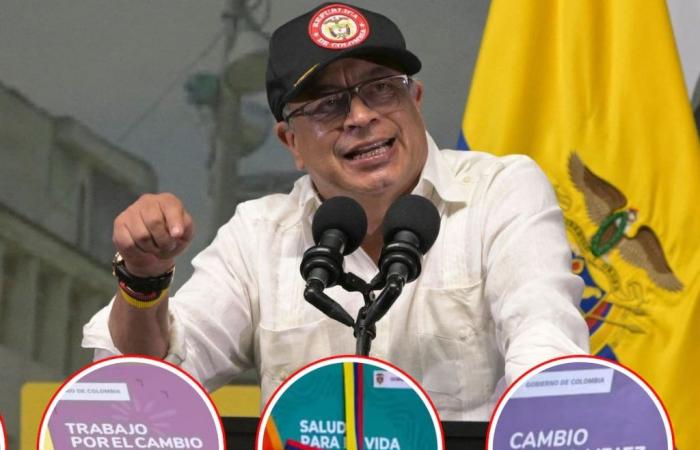Magazine The Economist assures that the president of Colombia, Gustavo Petro, has reached two years of government at a time when is ‘shaken, staggering and losing patience’ due to the lack of progress in its agenda marked by the development and approval of reforms to different systems in the country.
The stalled reforms: the pension
“The bills underpinning his signature reforms have stalled. There is opposition in Congress and in the streets. Mr. Petro is losing his patience. He is pushing Congress to pass the laws before the legislative session ends on June 20. His moderate allies are trying to stop him, so that his intransigence does not cause his approval to fall below 34% in which it has been stuck for months,” indicates the magazine.
In this analysis, the pension reform is first reviewed, highlighting that it is a system that needs reform taking into account that “Only a quarter of older Colombians receive a pension” and points out the key problem:
“Nearly three-quarters of that money goes to wealthy households, whose members tend to opt for a publicly funded defined benefit system that provides annual payments of up to 80% of their average salary at the end of their career. The OECD points out that Colombia is the only country in Latin America with a pension system that increases inequality.”
You are interested
Based on this, it is indicated that although the goal is to expand pension coverage to almost the entire population of retirement age, “many fear that the new model will be unaffordable. It could also deplete the size and health of private pension plans, which They are the country’s main savings vehicles and play an important role in its financial system”.
Health reform: the clashes in the streets
The Economist highlights that although today 95% of the Colombian population has access to health through the mixed public-private system“In April 2023, Petro presented a proposal to transform the role of private insurers in the health system, handing control of the public funds they currently manage to the State. As expected, he fired moderates in his cabinet who opposed the plan.”
In response to this, Economist reviews the protests against the reform, the blocking of the bill in Congress and how since then “the largest insurers in the country have accused the government of refusing to increase the contribution it makes in line with rising healthcare costs”.
The magazine recalls that “the same week that Congress blocked the reform, Supersalud, the body that regulates private insurers, took control of the two largest companies, eps Sanitas and Nueva eps. Luis Carlos Leal, director of Supersalud, happily describes the moment as ‘a coincidence of life’ “.
Petro’s path
For The Economist, “Petro is trying harder to rally his base. In March he called a constituent assembly to rewrite the country’s statutes, but has since backed down. After the April protests, he accused the opposition of planning a “soft coup” and called for a massive countermarch.”.
This situation hits investments in the country, which according to Fedesarrollo has caused the purchase of physical assets to plummet to its lowest level, matching the figures from 19 years ago. Added to this balance is that “growth has also been slow. Tax collection fell 10% in the first four months of 2024 compared to the same period of the previous year.”
Added to the balance of the reforms and the financial situation are the corruption scandals (investigation of bribes over money theft in La Guajira) and the violence crisis (shootings, kidnappings, displacements and attacks) that has been increasing in the south of the country. “undermining Petro’s campaign promise to achieve total peace.”
The Economist concludes that “almost halfway through his term, Petro is trying to accomplish his agenda by becoming more combative. But he needs to negotiate with Congress and appease protesters in order to successfully reform Colombia’s welfare system. “That requires less populism and more pragmatism.”


